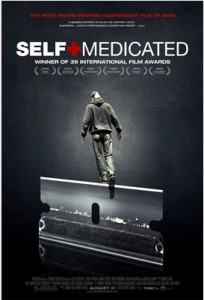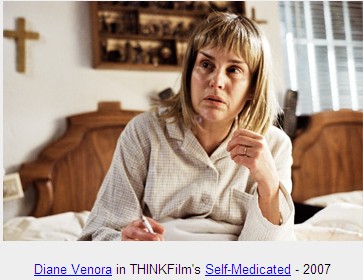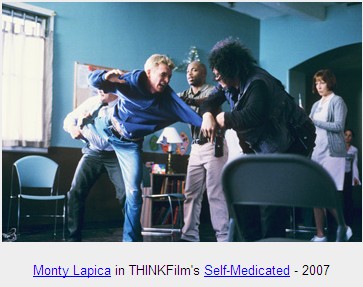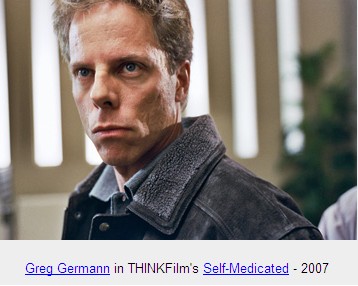By: debbie lynn elias
 There are several words to describe a man like Monty Lapica but the first two that come to mind are honest and brave. As writer, director and star, Lapica takes a leap of faith and “lays it all out there” with a cathartic semi-autobiographical look at his own personal fall from grace as a teen, the horrors and fallacies of one aspect of a “system” designed to help with recovery, and the strength and conviction of one individual. As if Lapica’s story isn’t compelling enough, his craftsmanship as a first time director is exemplary, at times innovative, and always visually appealing.
There are several words to describe a man like Monty Lapica but the first two that come to mind are honest and brave. As writer, director and star, Lapica takes a leap of faith and “lays it all out there” with a cathartic semi-autobiographical look at his own personal fall from grace as a teen, the horrors and fallacies of one aspect of a “system” designed to help with recovery, and the strength and conviction of one individual. As if Lapica’s story isn’t compelling enough, his craftsmanship as a first time director is exemplary, at times innovative, and always visually appealing.
Las Vegas. Bright lights. Big City. Parties 24/7. But beyond the glitz, glamour and high rolling, are residential communities with average American suburban families living the “typical” American life. Nice home with nicely manicured lawns. 2-car garage. Work, school, athletics, honor roll, min-vans. The Eriksens are such a family. Loving, supportive, a cohesive unit, and very proud of only son, varsity athlete and honor roll student, Andrew. Or at least they were until the untimely death of Andrew’s father.
Andrew is your All-American boy. Tall, lanky and good looking, he excels at everything he attempts be it academic or athletic. He has a high IQ and a glib tongue that is able to get him out of any situation. Admired by his peers and able to get any girl he wants, he seems to have it all. But with his father’s death, Andrew becomes a different person. He quits the sports teams. His GPA drops from a 4.0 to 1.7. Unable to deal with the pain of losing his father, he self-medicates with alcohol and drugs. He starts staying out to all hours of the night and comes home either drunk, high or both. He is belligerent, argumentative, flippant and cold to his old friends and only spending time with his new “cool” friends with like attitudes of disrespect for themselves and others. The only person who survives Andrews transition is his “best friend” Nicole (who obviously has a major crush on him.) Not “criminals” by any stretch of the imagination, to them fun is doing drive-by paint ball shootings. There are kids doing much worse in South Central LA.

His mother Louise is no better. Squirreling herself away in her bedroom seemingly from morning to night, she lives from one pill (or handfuls of pills) to the next, explaining her excessive substance abuse as being different than Andrew’s. Her form of self-medication is “prescribed.” (Although she seems to overlook the fact she has friends driving to Mexico buying mass quantities of “prescription drugs” for her but without prescriptions.) Out of touch with reality herself, but aware that something is wrong with her son, Louise knows that as a parent she needs to “do something”, anything to help her son. Yelling isn’t working. Demanding he “go to his room” isn’t working. And it’s a bit difficult for Andrew to take anything his mother says seriously when in his eyes, her conduct is as bad if not worse than his own.
Things come to a head when Andrew and Louise go head to head over Louise putting her dead husband’s ashes on a table in the entryway at the front door. Andrew can’t take it. He can’t take seeing “his father” like this. When push comes to shove, literally, Louise goes to the extreme and has Andrew kidnaped in the middle of the night by “officers” of an adolescent rehabilitation lock down center in St. George, Utah. Determined to help her son, she has him carted away in handcuffs, transported across a desert and put in a place not fit for man or beast.

Brightway is anything but bright as far as Andrew is concerned and is certainly not showing anyone “the way.” Run like a concentration camp, director Dan Jones is more like a Gestapo Commandant than a caring health care facility director. He personally subjects Andrew to a strip search, body cavity search and even stands over him in the shower as Andrew cleanses himself with special soaps – one for the body, one for the hair. Profanity or even using the H-E- double hockey-sticks word is punishable by fates just this side of death. Subjected to psychiatric evaluation by facility shrink Dr. Reinholtz, trouble is inevitable once Andrew’s IQ results are known. Always questioning, wanting answers and using sarcasm as a way to hide his pain, Andrew can’t submit to the rules and regulations of the center. Mail is read. Cameras are everywhere. Boys sit on one side of the cafeteria and girls on the other. Group counseling helmed by Jones is a joke to everyone, but only Andrew has the wisdom to see through the insanity of it all. But as if this center isn’t bad enough, Andrew quickly learns that this is only a stepping stone to 6 months of seclusion at their “headquarters” in Samoa. Knowing that he doesn’t belong in this sham, Andrew plots his escape, and thanks to a little divine intervention, a future.
I started this review describing Monty Lapica as brave. From the moment his face hits the screen, he is appealing and compelling, but once the story takes shape, his likeability turns into respect and yes, bravery. Brave to tell this story, to relive this chapter in his life. Even braver to “act” out his own demons on camera. At age 24, he can still pass for a respectful 18 years old and does so with integrity and exuberant defiance and pride. Perhaps an odd description, but it fits Lapica. Beyond the affability and accomplished emotional portrayal, what I most noticed in his performance are his eyes. Lapica’s eyes have a light that belies the torture Andrew is “living” but it is that light that showcases the survivability of Lapica and is undoubtedly the result of his own survival. He is a joy to watch.
Diane Verona takes on the arduous task of Andrew’s mother Louise. A very diverse actress with an award winning career, as Louise, she adds a new dimension to her characterizations. She capsulizes the vast ranges of Louise’s emotions, making them recognizable and understandable to the audience. You feel her anguish as a mother. You relate to her yelling and frustration. You feel her pain as a widow trying to cling to life and her son but thanks to her own self-medication, unable to do so. And you celebrate with her in little bits of joy like watching home movies or making breakfast for her son. Her emotional palette runs the gamut from A to Z and never falters. (Although the wigs she is wearing are the worst I have ever seen.)

Almost getting to the point of being evil incarnate in his roles, Michael Bowen tackles Dan Jones with an annoyingly successful balance of hatred, arrogance, and childish playground behavior. Best known as Richard Fish on “Ally MCBeal”, Greg Germann even comes on board this little independent as counselor Keith McCauley. Using false sincerity and the “let me be your buddy” philosophy as away to cozy up to the adolescent inmates and particularly Andrew, as Keith he is the one facility representative that actually does exhibit some competency and does impart some beneficial wisdom and caring, albeit through the back door. Kristina Anapua is notable as Andrew’s friend Nicole. Playing a friend to Andrew and to Louise, she brings her own level of cunning craftsmanship to the project effectively hiding truths and at the heart, having her own agenda playing against her overriding unconfessed love for Andrew.
Written and directed by Monty Lapica, the script took him 6 months to write. He wanted authenticity. He wanted believability. He wanted people to see his heart. He succeeded. By sticking to characters he knew intimately, a story he lived and did not try to “Hollywoodize”, the end result rings of honesty. Also key is that he succinctly portrays Brightway as the “scam” it truly is without going over the top or adversely affecting pending litigation against the facility by Lapica and others. (The facility has since been shut down by the authorities after Lapica’s stay.) With great attention to detail, Lapica creates such as Gabriel, a homeless man trying to earn a living washing cars for people coming off the freeway and who just happens to dispense some loving advice along the way. Very “Touched By An Angel” – yes. But very welcome and fitting to the story. Even smaller details come to light such as a row of remote controls (and I am talking a long row) across Louise’s headboard as if not only indicating she is running on remote with no independent thought or feeling but also adding to her own psychological prison which has her existing in her bedroom.
Remaining unanswered however are questions as to how Brightway was located and why any parent would go to that extreme without “research” to intentionally incarcerate their child in a facility such as that.
Wanting the film to be as authentic as possible, Lapica knew he had to shoot on location. Born and raised in Vegas, he knows the town like the back of his hand and it shows with lensing not only on the strip, but in those suburban All-American neighborhoods. For Brightway, he gained access to a functioning State Mental Hospital in Norwalk, California complete with lockdown, cameras, bars, etc. And as if that isn’t enough, beauteous scenic vistas from Hawaii and Sedona, Arizona complete the picture.
As a first time filmmaker Lapica amazed me technically. Calling on veteran Director of Photography Denis Maloney, they elected to shoot in Super 35mm which affords a sharp richness and crispness that bodes well in this film, as well as allowing for some exquisite lensing along the Vegas Strip that blurs into fantastical color. The icing on the cake is Anthony Marinelli’s score.
Already an award winner at 39 international film festivals, Monty Lapica has clearly found a new and successful form of self-medication; the art of film, starting with SELF-MEDICATED. We should all have his strength and conviction.
Monty Lapica – Andrew Eriksen Diane Venora – Louis Eriksen Michael Bowen – Dan Jones Greg Germann – Keith McCauley
Written and directed by Monty Lapica. Rated R. (107 min)












